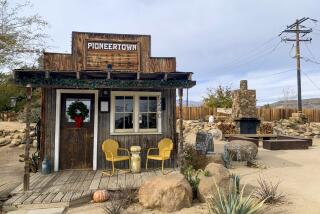Netflix series hypes the Sunset Strip’s luxury real estate sizzle
- Share via
Netflix has joined Bravo in probing the cheesy conventions of L.A.’s celebritized real estate world. Its offering, the guilty pleasure docu-soap “Selling Sunset,” launched with eight episodes on March 22.
New recruit and people pleaser Chrishell Hartley (a soap opera regular) wades into the shark tank to meet four mostly trash-talking female agents at Sunset Strip’s Oppenheim Group.
The firm’s principals –– identical twins Jason and Brett Oppenheim –– largely keep to their laptops, while the women tour properties for clients but also spend much of their on-screen time gossiping: hunky men; client poaching; and if moissanite, a faux diamond, counts as an engagement ring (of course it doesn’t).
Oh, and the show includes some Westside real estate, hovering around the $5-million mark with a few standouts. Included is a $40-million under-construction Hollywood Hills manse that the agency will list this summer.
Founder Jason Oppenheim took a break from showing Orlando Bloom’s freshly remodeled $9-million Beverly Hills home to speak with us.
On the show, you and your brother are faded wallpaper fronted by the women’s splashy lives. Tell us about Jason.
I’m a very alpha, kind of controlling and aggressive real estate agent. I think the women counterbalance my tendencies. I’m very, very honest and very direct. I push back a lot with clients. I bring in a zealous advocacy that I learned as an attorney. I think my clients really appreciate that.
How have you pushed back with Orlando Bloom as you’ve repped his house?
I convinced him to move forward with this pool even though it’s very expensive, over a half-million dollars, and would take over a year. Even halfway down the road he still called and said, “Are you sure?” And I said, “Absolutely. It’s imperative for a house of this magnitude and quality that you spend the money for a zero-edge pool.”
The show is framed by lavish parties, copious drone shots, dry-ice martinis …
More and more, the real estate professional has become celebritized. Clients really expect a lot. Marketing a property is not what it used to be, whether it’s social media or entertainment. I think it’s actually starting to separate a lot of the new agents from agents that have been around a long time.
Christine Quinn is the show’s brassy provocateur, playing cat to Chrishell Hartley’s mouse. Are such machinations an advantage in high-end real estate?
I’m always amazed at how different skill sets can work in real estate, with the common denominator of intelligence and hard work. There are enough people out there that you will find a niche of clients who will work with you.
Nice that two relationships on the show invert the norm of wealthy older men who couple with young women.
To see women –– successful, beautiful, strong, confident, intelligent –– attracting impressive young beautiful men that are significantly younger than themselves, I think it’s refreshing. They’ve chosen well for themselves.
In your rarified orbit of chauffeurs and rose-gold Audemars Piguet watches, how do you keep it real?
One of the reasons that I encourage my team to volunteer at Food on Foot (a nonprofit that helps the poor and homeless) is because it’s so easy to lose perspective –– we’re driving around in Rolls-Royces showing $10-million homes to tech billionaires.
Given that L.A.’s fevered real estate market has contributed to the city’s affordable-housing crisis, do elite agents have an obligation to give back?
Absolutely. We represent the upper 1/10th of 1% of our community, and I think it’s naive and disrespectful not to recognize and fulfill our obligation, most importantly, to the opposite, bottom 1%. I contribute a significant amount of money to Food on Foot for that very reason. The bottom 1% is just as important as the top 1%.
More to Read
Sign up for Essential California
The most important California stories and recommendations in your inbox every morning.
You may occasionally receive promotional content from the Los Angeles Times.






